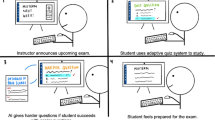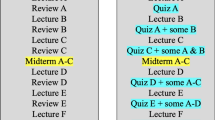Abstract
The main purpose of this study is to investigate the effects of integration of online learning and assessment in synchronization form (OLASF) on students’ learning performance. The study seeks to evaluate how the synchronization content with immediate assessment can affect the knowledge performance of the students. An experimental design with digital formative assessment tools was used to fulfill the research purpose. Participants were 64 undergraduate students enrolled in is introduction to computer and programming (CSC 101) at Qassim University. The students from level five were divided into two-treatment groups: online learning & assessment instruction in Synchronization form using Nearpod, and PowerPoint instruction with traditional form. The experiment was completed within 6 weeks. Formative assessment test was used to access students learning performance after class. Descriptive statistics and a t-test were used to analyze the data. Our findings revealed that the use of OLASF was an intrinsic motivation and could be a promising way of enhancing students’ learning performance.






Similar content being viewed by others
References
Amasha, M. A., & Alkhalaf, S. (2016). Using RSS 2.00 as a model for u-learning to develop e-training in Saudi Arabia. International Journal of Information and Education Technology, 6(7), 516–521.
Apperson, J. M., Laws, E. L., & Scepansky, J. A. (2008). An assessment of student preferencesfor PowerPoint presentation structure in undergraduate courses. Computers & Education, 50(1), 148–153.
Beach, P. (2017). Self-directed online learning: A theoretical model for understanding elementary teachers' online learning experiences. Teaching and Teacher Education, 61, 60–72.
Bernardo, V., Ramos, M. P., Plapler, H., de Figueiredo, L. F. P., Nader, H. B., Anção, M. S., & Sigulem, D. (2004). Web-based learning in undergraduate medical education: Development and assessment of an online course on experimental surgery. International Journal of Medical Informatics, 73(9), 731–742.
Buchanan, T. (2000). The efficacy of a world-wide web mediated formative assessment. Journal of Computer Assisted Learning, 16(3), 193–200.
Challis, D. (2005). Committing to quality learning through adaptive online assessment. Assessment & Evaluation in Higher Education, 30(5), 519–527.
Chen, K. C., & Jang, S. J. (2010). Motivation in online learning: Testing a model of self-determination theory. Computers in Human Behavior, 26(4), 741–752.
Chou, P. N., Chang, C. C., & Lu, P. F. (2015). Prezi versus PowerPoint: The effects of varied digital presentation tools on students’ learning performance. Computers & Education, 91, 73–82.
Dobson, J. L. (2008). The use of formative online quizzes to enhance class preparation and scores on summative exams. Advances in Physiology Education, 32(4), 297–302.
Faber, J. M., Luyten, H., & Visscher, A. J. (2017). The effects of a digital formative assessment tool on mathematics achievement and student motivation: Results of a randomized experiment. Computers & Education, 106, 83–96.
Gikandi, J. W., Morrow, D., & Davis, N. E. (2011). Online formative assessment in higher education: A review of the literature. Computers & Education, 57(4), 2333–2351.
Hwang, G. J., & Chang, H. F. (2011). A formative assessment-based mobile learning approach to improving the learning attitudes and achievements of students. Computers in Education, 56(4), 1023–1031.
Johnson, B. C., & Kiviniemi, M. T. (2009). The effect of online chapter quizzes on exam performance in an undergraduate social psychology course. Teaching of Psychology, 36(1), 33–37.
Khezrlou, S., & Ellis, R. (2017). Effects of computer-assisted glosses on EFL learners' vocabulary acquisition and reading comprehension in three learning conditions. System, 65, 104–116.
Lane, A. (2017). The impact of technology on the teaching and assessment of ‘systems’ diagrams in two online environmental management modules. Open University, Milton Keynes.
Liu, Y., & Liu, M. (2017). An online learning approach to improving the quality of crowd-sourcing. IEEE/ACM Transactions on Networking, 25, 2166–2179.
McKenzie, W. A., Perini, E., Rohlf, V., Toukhsati, S., Conduit, R., & Sanson, G. (2013). A blended learning lecture delivery model for large and diverse undergraduate cohorts. Computers & Education, 64, 116–126.
Means, B., Toyama, Y., Murphy, R., Bakia, M., & Jones, K. (2009). Evaluation of evidence-based practices in online learning: A meta-analysis and review of online learning studies. US Department of Education.
Ofiesh, N. (2006). Response to intervention and the identification of specific learning disabilities: Why we need comprehensive evaluations as part of the process. Psychology in the Schools, 43(8), 883–888.
Oosterhof, N. N., & Todorov, A. (2008). The functional basis of face evaluation. Proceedings of the National Academy of Sciences, 105(32), 11087–11092.
Ozcelik, D. A. (1981). Okullardaolcmevedegerlendirme (measurement and evaluation in the schools). Ankara: USYM-EgitimYayinlari.
Pachler, N., Daly, C., Mor, Y., & Mellar, H. (2010). Formative e-assessment: Practitioner cases. Computers & Education, 54(3), 715–721.
Rovai, A. P. (2004). A constructivist approach to online college learning. The Internet and Higher Education, 7(2), 79–93.
Savoy, A., Proctor, R. W., & Salvendy, G. (2009). Information retention from PowerPoint™ and traditional lectures. Computers & Education, 52(4), 858–867.
Sclater, N., & Howie, K. (2003). User requirements of the “ultimate” online assessment engine. Computers & Education, 40(3), 285–306.
Şendağ, S., & Odabaşı, H. F. (2009). Effects of an online problem based learning course on content knowledge acquisition and critical thinking skills. Computers & Education, 53(1), 132–141.
Shea, P., Li, C. S., & Pickett, A. (2006). A study of teaching presence and student sense of learning community in fully online and web-enhanced college courses. The Internet and Higher Education, 9(3), 175–190.
Song, L., Singleton, E. S., Hill, J. R., & Koh, M. H. (2004). Improving online learning: Student perceptions of useful and challenging characteristics. The Internet and Higher Education, 7(1), 59–70.
Stull, J. C., Majerich, D. M., Bernacki, M. L., Jansen Varnum, S., & Ducette, J. P. (2011). The effects of formative assessment pre-lecture online chapter quizzes and student-initiated inquiries to the instructor on academic achievement. Educational Research and Evaluation, 17(4), 253–262.
Thurlow, M. L., Johnstone, C. J., & Ketterlin-Geller, L. R. (2008). Universal design of assessment. Universal design in higher education: From principles to practice, 73–81.
Triantafillou, E., Pomportsis, A., & Demetriadis, S. (2003). The design and the formative evaluation of an adaptive educational system based on cognitive styles. Computers in Education, 41(1), 87–103.
Tzeng, G. H., Chiang, C. H., & Li, C. W. (2007). Evaluating intertwined effects in e-learning programs: A novel hybrid MCDM model based on factor analysis and DEMATEL. Expert Systems with Applications, 32(4), 1028–1044.
Vonderwell, S., Liang, X., & Alderman, K. (2007). Asynchronous discussions and assessment in online learning. Journal of Research on Technology in Education, 39(3), 309–328.
Wilson, K., Boyd, C., Chen, L., & Jamal, S. (2011). Improving student performance in a first-year geography course: Examining the importance of computer-assisted formative assessment. Computers & Education, 57(2), 1493–1500.
Wolsey, T. D. (2008). Efficacy of instructor feedback on written work in an online program. International Journal on E-Learning, 7(2), 311.
Author information
Authors and Affiliations
Corresponding author
Rights and permissions
About this article
Cite this article
Amasha, M.A., Abougalala, R.A., Reeves, A.J. et al. Combining Online Learning & Assessment in synchronization form. Educ Inf Technol 23, 2517–2529 (2018). https://doi.org/10.1007/s10639-018-9728-0
Received:
Accepted:
Published:
Issue Date:
DOI: https://doi.org/10.1007/s10639-018-9728-0




